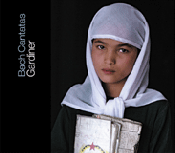Several complete recording series offer
important renditions of these works with “period” forces under
the direction of directors like Nikolaus Harnoncourt, Gustav Leonhardt, and
Ton Koopman. The Cantata Pilgrimage of John Eliot Gardiner and the Monteverdi
Choir undertakes the complete corpus, as well, but within a new and decidedly
ambitious context: recordings made from live concerts and dress rehearsals
given weekly throughout the year 2000, each in a different ecclesiastical
venue, and each devoted to the cantatas for a particular liturgical day. The
context is one that certainly invites a resonance with the “frenzy of
steady prolificity” that would have characterized Bach’s early
years in Leipzig, a period in which he essentially wrote, rehearsed, and
performed a new cantata every week. Gardiner’s performances are
polished, often elegant, often dramatic readings that do not seem to betray
the frenzy and vagaries that must have accompanied the production. However,
from the standpoint of reception, our knowledge that these recordings are
documents of this extraordinary undertaking shapes and forms the way we hear
them; it alerts us at some level to the sense of these works as dynamic and
fluid, and this is an important stamp for these recordings to bear.
Additionally, given the works’ importance to our understanding of Bach,
there is an appealing convenience to having them arranged by liturgical
occasion: namely, we can savor Bach’s engagement of a common
theological theme in juxtaposed styles that give us a rich sense of his
development as a composer.
The recording aspect of the project was initially to be undertaken by
Deutsche Gramophone. Their abandoning of the Pilgrimage recordings at an
early stage prompted Gardiner to launch his own label, Soli Deo Gloria, and
from the lavish look of the early volumes in the series, that independence
has allowed the discs to be presented in distinctively engaging ways. Liner
notes draw on Gardiner’s journal from the pilgrimage, thus allowing a
congenial degree of anecdote as well as comment to emerge; jewel cases and
program books are replaced with a hardbound volume and glossy page style;
most striking are the cover photographs: highly compelling portraits of
people from Afghanistan, Tibet, India, etc. by photographer Steve McCurry.
The playing against expectation here is striking. Are the images ones that
invite us to consider Bach as a somehow universal voice? Are the images ones
that, in their geographic dispersion, invite us to linger with the idea of
pilgrimage? One way or another, they prove dynamic and mark the volumes with
distinction.
Volume 10 focuses on two liturgical dates, the Nineteenth Sunday after
Trinity (BWV 48, BWV 5, BWV 56) and Reformation Sunday (BWV 79, BWV 192, BWV
80) with an additional cantata for Trinity XXV (BWV 90) added for good
measure. Much here is a study of contrasts. The lessons for Trinity XIX
underscore a Pauline division between body and soul, a contrast that itself
is held in tension with the Gospel account of the healing of the body. The
sin and sickness themes of these lessons are in turn strongly contrasted by
the jubilant, celebrative tone of Reformation Sunday.
The Trinity XIX cantatas are richly affective—the lithe, incisive
lines of the opening chorus of “Ich elender Mensch,” BWV 48, for
instance, are hauntingly lamentative. And much in these cantatas plays on
vivid imagery. The tenor aria in “Wo soll ich fliehen hin,” BWV 5
is based on the washing of sins in the blood of Jesus’ wounds, an image
that Bach develops in richly melismatic, fluid writing for solo
viola, played with notable fluency by Jane Rogers. Similarly, a bass
recitative in “Ich will den Kreuzstab gerne tragen,” BWV 56 is
also “liquid”—“My life on earth is like a voyage at
sea,” imagery to which Bach familiarly responds with solo cello
arpeggios: the waves of the sea. Particularly impressive is the aria for
trumpet and bass in “Wo soll ich fliehen hin.” Both the
instrumentation and the choice of voice embody a show of strength, elicited
here by the text’s facing the “horde of hell.” And as is
often the case with Bach’s trumpet and bass arias, the demands on both
singer and player create a tour de force. In this case, bass Peter
Harvey’s commanding execution and dramatic use of articulation combine
splendidly with trumpeter Neil Brough’s difficult florid passage work,
executed with unwaning confidence. (These two also perform a similar aria in
“Es reisset euch, BWV 90, triggered by apocalyptic imagery, and equally
impressive in the rendition.)
There is much to celebrate in the celebrative Reformation Day works. The
general jubilance of the cantatas inspires brisk tempos, often full of
dance-like buoyancy, and the ensemble’s ability to maintain an athletic
agility is striking. This becomes especially significant with regard to the
size of the ensemble itself. Gardiner has resisted here the trend to perform
Bach’s choral works with a “choir” of one-to-a part, opting
instead for seventeen singers. And while the argument for a solo choir does
not rest on questions of agility—it is rooted primarily in historical
documentation—one of the conspicuous by-products of one-to-a part
singing is often greater ease with fast passage work. Gardiner’s
ensemble belies that notion, however, giving ample proof of remarkable
agility.
It is not difficult to imagine that Gardiner and his forces faced many
practical challenges along the pilgrim way. As the liner notes recall,
balance in the wonderful canon that opens “Ein Feste Burg,” BWV
80, proved unexpectedly difficult to achieve in the Schlosskirche in
Wittenberg: the instrumental bass was overwhelmed by its treble counterpart.
Accordingly, at the last minute a sackbut player from Leipzig was recruited
to “even up the sides.” The trombone’s entry in this most
rousing of canons is thrilling, and one of the most memorable moments in the
volume. One can but look forward to all of the surprise challenges of the
Pilgrimage having equally felicitous outcomes.
Steven Plank
Oberlin College
